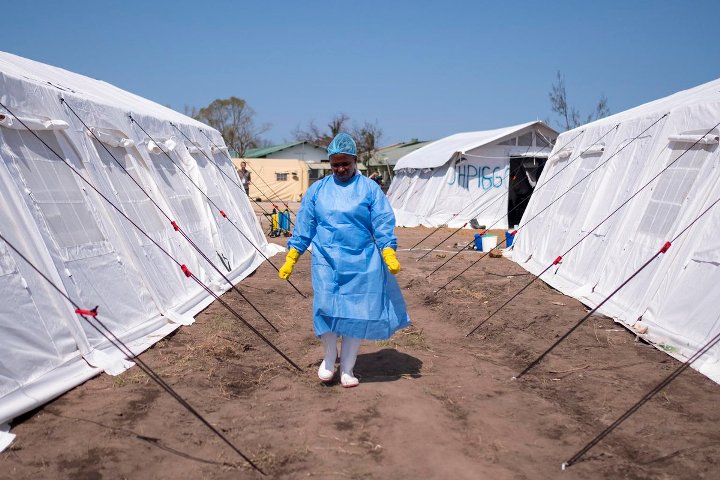Africa Unites Against Cholera: AU Leaders Launch Bold Continental Action
As of May 2025, Africa has reported approximately 130,000 cholera cases and over 2,700 deaths, accounting for 60% of global cases and a staggering 93.5% of all cholera-related deaths worldwide.

- Country:
- Ethiopia
In a landmark show of unity, political will, and urgency, 20 African Union (AU) Member States came together on 4 June 2025 in a high-level virtual summit convened by the Africa Centres for Disease Control and Prevention (Africa CDC) to accelerate the elimination of cholera across the continent. The historic meeting was held under the leadership of H.E. Hakainde Hichilema, President of Zambia and AU Champion on Cholera, and was hailed as a watershed moment in Africa’s public health response.
Alarming Statistics Spur Continental Action
As of May 2025, Africa has reported approximately 130,000 cholera cases and over 2,700 deaths, accounting for 60% of global cases and a staggering 93.5% of all cholera-related deaths worldwide. Countries such as Angola, the Democratic Republic of Congo (DRC), Sudan, and South Sudan remain among the hardest hit.
The summit drew participation from ten Heads of State and Vice Presidents, including high-level leaders from Angola, Zambia, DRC, Namibia, Ghana, Malawi, Mozambique, South Sudan, Tanzania, and Zimbabwe. Also present were Deputy Prime Ministers, Ministers of Health, Finance, and Water, alongside major global health partners—WHO, UNICEF, Gavi, the Global Fund, and others.
A Unified Political and Multisectoral Response
In his keynote address, H.E. Mahmoud Ali Youssouf, Chairperson of the African Union Commission, emphasized the need for direct presidential engagement to end cholera by 2030. He called for integrated action driven by national leadership, domestic investment, and continental cooperation.
President João Lourenço of Angola and current AU Chair echoed this sentiment, stating:
“We must invest robustly in water, sanitation, and healthcare systems. This is not just about cholera—it's about transforming adversity into economic opportunity.”
Africa CDC Director General Dr. Jean Kaseya outlined systemic challenges contributing to the cholera crisis, notably limited WASH infrastructure, insecurity, weak coordination, and critical vaccine shortages. Africa requires 54 million doses of oral cholera vaccine annually but receives barely half.
Global Support and Vaccine Commitments
WHO Director-General Dr. Tedros Adhanom Ghebreyesus applauded the AU’s initiative and pledged increased technical support to affected countries.
Gavi CEO Dr. Sania Nishtar highlighted progress in vaccine deployment—rising from just 2 million doses in 2013 to over 21 million in 2025. She also emphasized Gavi’s delivery of 1.9 million rapid diagnostic kits and reaffirmed support for the African Vaccine Manufacturing Accelerator (AVMA), urging international donors to back the upcoming Gavi replenishment.
Prioritizing Local Solutions and Children’s Health
UNICEF Regional Director Etleva Kadili underscored the heavy toll cholera takes on children, stressing that bold reforms must prioritize the youngest and most vulnerable. Her remarks were supported by leaders committing to establishing Presidential Task Forces on Cholera, focused on strengthening multi-sectoral coordination, resource mobilization, and accountability frameworks.
Key Outcomes of the High-Level Meeting
The summit concluded with a resounding Call to Action, marked by the following resolutions:
-
Operationalizing a Continental Incident Management Support Team (IMST) modeled on the successful mpox response.
-
Establishing Presidential Cholera Task Forces in all affected countries.
-
Scaling up WASH infrastructure and domestic financing for cholera control.
-
Expanding local vaccine manufacturing and streamlining cross-border vaccine distribution.
-
Leveraging community-led health initiatives to improve outbreak detection and resilience.
The Road Ahead: One Africa, One Response
President Hakainde Hichilema, in his closing remarks, committed to updating the AU Assembly on progress made by all countries:
“We now have one continental IMST, one community-centered plan, and one accountability framework. What remains is the commitment to deliver results.”
With clear targets and continental solidarity, this summit marks a pivotal step in transforming cholera from a persistent threat to a defeated disease—championed by Africa’s highest offices, with the world watching.










